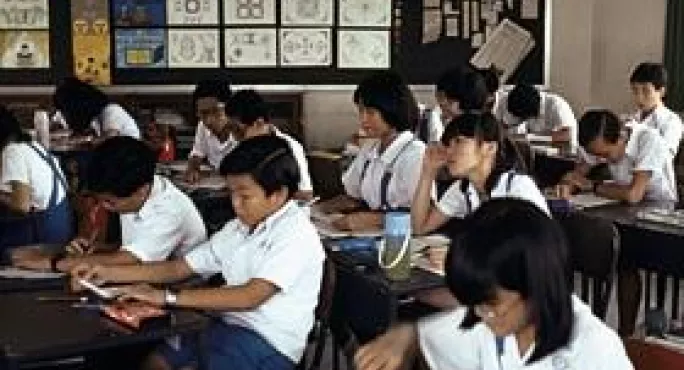Where university dreams can end at 12

Singapore’s education system is being held up by Michael Gove as the model for his plan to reform England’s secondary system with harder O level-style exams. Last week, the education secretary said the Asian city state proved it was possible for 80 per cent of pupils to get good passes in exams that are “more rigorous” than GCSEs.
“There is nothing intrinsic to Singapore schools - or Singapore children - which means that we cannot do the same here,” Mr Gove said.
Is he right? Will emulating this small system, with just 155 secondaries, produce similar results in England? Or will it create the “two tier” cap on aspiration his critics fear?
There is no doubting Singapore’s success in the Organisation for Economic Cooperation and Development’s influential Programme for International Student Assessment (Pisa). In the last edition of the international survey, published in 2010, the territory finished second out of more than 60 jurisdictions around the world in maths, fourth in science and fifth in reading.
But as with Finland and Hong Kong - two other high-performing overseas systems previously held up by Mr Gove - doubts have been raised over the ability of England to import Singapore’s success.
Professor Clive Dimmock, a University of Leicester academic now leading a research project for Singapore’s National Institute of Education, knows both systems well. He is sympathetic to Mr Gove’s plan to reform GCSEs, but warns: “Singapore is so different (from England) in so many different ways.” And that includes the nuts and bolts of its schools system.
All pupils sit primary school leaving exams at the age of 12, but, unlike England’s Sats, these results are not ignored by most secondaries. In the vast majority of cases, the outcomes effectively determine the rest of a pupil’s educational career.
“They don’t countenance the notion of late development in Singapore like we do in the West,” Professor Dimmock notes. This creates a “pressure cooker” for primary pupils and can lead to pupils spending an extra four hours studying every night, with parents spending “huge amounts” on private tutors, he adds.
The primary tests mean entry to elite specialist secondaries for a small, talented minority of pupils. For the rest, the results decide which stream they enter at a standard secondary school. About 60 per cent of pupils are placed on a four-year “express” course, leading to O-level exams set in partnership with England’s Cambridge International Examinations (CIE) board. This is the standard route to A levels and then university. Some particularly bright “express” pupils are able to skip O levels altogether.
Another 25 per cent of the cohort is placed in the “normal academic” stream, with the rest (in 2010 it was 13 per cent) put in the “normal technical” stream. There is scope for transferring between streams, but in practice they are rigid. “I would be surprised if more than 5 per cent of pupils move,” Professor Dimmock said.
Pupils in both “normal” streams take four-year courses leading to qualifications called N (normal) levels, also provided by CIE, with about three-quarters of pupils in the academic stream staying on for a fifth year to take O levels.
Mr Gove’s leaked proposals faced criticism for proposing simpler exams for less intelligent pupils. Professor Dimmock confirms that N levels are at a similar standard to England’s old CSEs.
But Ann Puntis, chief executive of CIE, notes that the N-level curriculum overlaps with the O level. “It is not a two-tier education; it is not about grammar schools and secondary moderns; it is not about `writing off’ young people as second rate,” she said. “It tells it like it is. N level is clearly understood, allows for progression to O level and provides an effective scaffold for educational achievement.”
But Professor Dimmock said the chances of anyone who began in a “normal” stream finishing among the top 25 per cent who make it to a Singapore university are “virtually nil”.
“Normal technical” pupils can theoretically sit O levels, but are far more likely to go on to vocational study. This is where Professor Dimmock argues that Singapore excels. Pupils are not “put on the scrapheap”, suffer no stigma, and the institutes of technical education they progress to “are resourced like the best universities”.
“In the UK, if you don’t make it to university you end up somewhere with low prestige and low funding,” he said. “Here it is totally different. There is money and they give these kids a really good technical education.”
It is a cultural difference that Mr Gove appeared to acknowledge when he described Singapore as “orientated towards excellence, demanding of every child”. But any attempt to replicate its system in England - which has never overcome its snobbery towards non-academic education - could be the education secretary’s biggest challenge yet.
`EXTREME FREEDOM’
Ministers are yet to formally announce their proposals for reforming secondary education. But the plans are understood to include the following:
Exam boards bidding for franchises to run “explicitly harder” O level- style exams in English, maths and science, which would be sat by 2016.
Less intelligent pupils sitting simpler CSE-style exams, with the possibility of later progression to “O levels”.
Replacing the existing secondary national curriculum with “very, very short” programmes of study to give teachers “extreme freedom”.
Original headline: The land where dreams of university can end at 12
Keep reading for just £1 per month
You've reached your limit of free articles this month. Subscribe for £1 per month for three months and get:
- Unlimited access to all Tes magazine content
- Exclusive subscriber-only stories
- Award-winning email newsletters



